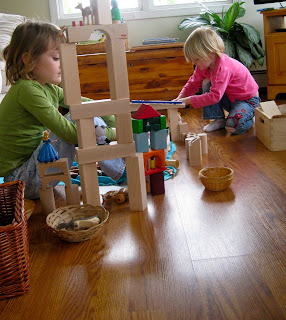
In my Montessori training I was introduced to the concept of a "work cycle." In short, Dr. Montessori taught the importance, backed by her own observation and study, of giving children a lengthy period of time, three hours to be precise, of uninterrupted work time. This period of time was determined by Dr. Montessori as the required amount of time for a child to progress into the most in depth concentration and intellectual exploration, which then results in the most significant progression and growth. Dr. Montessori taught that not only will this lengthy, uninterrupted time lead to the most intellectual growth, but equally important, at it's conclusion it leaves the child with a feeling of peace and calm satisfaction. In my own observations as a stay at home mother, I have often wondered if a "work cycle" is the same as a "play cycle?" Montessori did say that "play is the work of the child." I believe they are one in the same.

Dr. Montessori elaborated a bit on the work cycle when she observed reasons for such a lengthy work time, I too make these same observations with my own children. Montessori taught in the beginning of the work cycle a child will choose (or sometimes wander until something catches his attention) and work with an object for shorter periods of time. They play and work but it changes from one to the next as their shorter attention dictates. I see this almost every morning in our home. We have playtime in the morning as soon as breakfast is finished. My daughters will wander and start and change activities more frequently. It is at this time that they haven't found that activity that will carry them through the morning. Montessori then taught that as the work cycle continues, the child displays a false sense of fatigue. It is at this point the adult questions the cycle and often ends the cycle to change activities- therefore ending play/work time. Montessori taught that this false fatigue is instrumental in allowing the child to move to the most important work to come. Yes, this is the time when as a mother I wonder if they are actually going to find an activity they can stick with. Sometimes they ask for a snack (snack is whenever they want it during the morning allowing us to continue the cycle and not interrupting the most important time), and sometimes they just continue to move to the next activity. Montessori said it is after the false fatigue that the child will find the activity that he/she will delve into with great concentration and focus- almost like everything else was a warm up for the work/play to come.

This usually happens at the last third of our play time. It is at this point they have found the activity - the activity that they are so focused on, using so much creativity and attention that they are immersed in it. And finally, Dr. Montessori observed at the conclusion of the cycle the child is at peace with a calm satisfaction and content, as if rested. One of the reasons we don't run errands or have other planned interruptions in our morning is because I guard this time as a very important part of our day. If my children get the entire play/work time, uninterrupted, I know we will have a better day. I see the concentration, the peace, the focus, the creativity, the lengthening of their attention and in all, the important work that is done when I give them a long, uninterrupted time for play and work each day.




